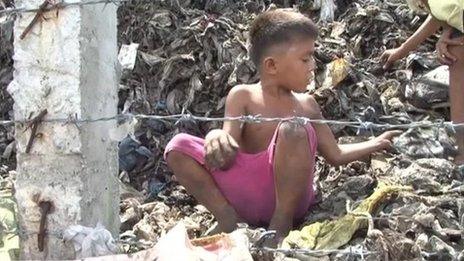Philippines: After the storm
- Published

Some Manila residents make money from collecting rubbish - calling themselves commodity traders
In a shantytown on the outskirts of Manila, I met a group of women who had moved from typhoon-devastated Tacloban in search of better lives.
One woman is in tears as she is about to be forcibly relocated from this slum due to redevelopment. She says that her new home is two hours away and would be too far for her to go to work. She is worried that the government won't provide help to re-establish her family's lives.
People like her encapsulate the uneven progress of the Philippines' economy.
The Philippines is projected to be the fastest growing economy in Southeast Asia and the second fastest in Asia after China.
GDP growth last year reached 7.2%. Together with 2012 growth at 6.8%, it was the fastest two-year growth period since the 1950s.
Offset
It may be surprising to hear this six months after one of the worst typhoons to hit the country, but greater government spending and capital investment to rebuild can have that impact.
The regions hit by Typhoon Haiyan account for less than one-fifth of GDP or national output, and are primarily agricultural.
So the initial impact is negative for GDP in the first half of the year, but its reconstruction will boost growth such that the second half growth should pick up to an estimated 6.5%.
For instance, the government plans to spend 3.5% of GDP on rebuilding, with the aim of offsetting the impact of the typhoon which is estimated to cut 2014 growth by one percentage point.
New Tiger
The recovery is also due to the progress that the country had made in terms of developing industrial capacity and infrastructure.
Last year, the Philippines joined the ranks of investment-grade countries for the first time as all three major credit rating companies raised its sovereign debt out of junk category.
The potential to transform from the "sick man of Asia" into one of the New Tiger economies has been there for some time. Manila post-independence was viewed as one of the most promising cities in the region.
It is a reference to the next generation, following the rapid rise of the original Tiger economies of South Korea, Taiwan, Hong Kong, and Singapore whose transformative growth rates from the mid 1960s to the 1990s spawned the term the "East Asian Miracle."
Corruption
But the Philippines lagged those neighbours that practised export-led growth.
It's one of the reasons why the Philippines is still just at the cusp of being a middle-income country. Also, key sectors are closed to competition and plagued by corruption.
The Philippines ranks among the worst countries by the World Bank in terms of starting a business.
Allegedly tired of the country's label as the "sick man," President Aquino has focused on economic reforms since he took office in 2010.
But, there are worrying signs that the strong growth in the past few years is also due to the cheap money that has been injected by Western central banks since the global financial crisis. The stock market has not only hit record highs, but has tripled in value since 2009.
Shantytowns
Also, consumption and construction - both of which are affected by cheap credit are notable growth drivers. For instance, the Philippines has nine of the world's 38 largest shopping malls, more than even the US or China, according to the business publication Forbes.
When the era of cheap money ends, there are risks that I have written about, particularly for emerging economies.
The country is also very dependent on remittances, which account for a staggering 10% of GDP. The high level is due to one out of 10 Filipinos working abroad, though recently there are some signs that is changing with more returnees.
Worryingly, economic growth hasn't yet translated into enough jobs for those whose homes are still in make-shift shantytowns. I am told that they want jobs -not hand-outs.
These slum dwellers make their living through scavenging - collecting rubbish that is sold to recycling plants. I am told that the Filipino term for this type of garbage is commodity, so they call themselves "commodity traders". It's not quite the typical image of a commodity trader.
The Philippines' economy has significant potential and has begun to realise some of it; but there is still much more to be done not just for the economy but for its people.
Catch Talking Business with Linda Yueh from Manila from 25 May and the rest of the Philippines Direct season from today until May 30: bbc.com/philippinesdirect.